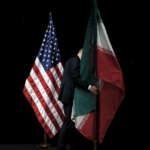
Donald Trump’s election as President guarantees that America’s Middle East policy will change. The real question, though, and a major early test for Trump, is whether it will change enough. Does he understand that the region’s geopolitics differ dramatically from when he left office, and could change even more before Inauguration Day? The early signs are not promising that Trump grasps either the new strategic opportunities or threats Washington and its allies face.
The region’s central crisis on January 20 will be Iran’s ongoing “ring of fire” strategy against Israel. Right now, Israel is systematically dismantling Hamas’s political leadership, military capabilities, and underground Gaza fortress. Israel is similarly dismembering Hezbollah in Lebanon: its leadership annihilated, its enormous missile arsenal steadily decimated, and its hiding places shattered. Israel will continue degrading Hamas, Hezbollah, and West Bank terrorists, ultimately eliminating these pillars of Iranian power. Even President Biden’s team has already urged Qatar to expel Hamas’s leaders(https://www.cnn.com/2024/11/08/politics/qatar-hamas-doha-us-request/index.html).
Unfortunately, Yemen’s Houthis, still blocking the Suez Canal-Red Sea passage, have suffered only limited damage, as have Iran’s Shia militia proxies in Syria and Iraq. Iran itself finally faced measurable retaliation on October 26, as Israel eliminated the Russian-supplied S-300 air defenses and inflicted substantial damage on missile-production facilities. Nonetheless, Iran’s direct losses remain minimal. Due to intense White House pressure and the impending US elections, Jerusalem targeted neither Tehran’s nuclear-weapons program nor its oil infrastructure.
Whether Israel takes further significant action before January 20 is the biggest unknown variable. Israel’s October 26 air strikes have prompted unceasing boasting from Tehran that it will retaliate in turn. These boasts remain unfulfilled. The ayatollahs appear so fearful of Israel’s military capabilities that they hope the world’s attentions drift away as Iran backs down in the face of Israel’s threat. If, however, Iran does summon the will to retaliate, it is nearly certain this time that Israel’s counterstrike will be devastating, especially if during the US presidential transition. Israeli Defense Forces could lay waste to Iran’s nuclear-weapons and ballistic-missile programs so extensively they rock the foundations of the ayatollahs’ regime.
Washington’s conventional wisdom is that Trump will return to “maximum pressure” economically against Iran through more and better-enforced sanctions, and stronger, more consistent support for Israel, as during his first term. If so, Tehran’s mullahs can relax. Trump’s earlier “maximum pressure” policy was nothing of the sort. Even worse, a Trump surrogate has already announced that the incoming administration will have “no interest in regime change in Iran(https://www.timesofisrael.com/ex-envoy-says-trump-aims-to-weaken-iran-deal-of-the-century-likely-back-on-table/),” implying that the fantasy still lives that Trump could reach a comprehensive deal with Tehran in his second term.
Moreover, despite the staged good will in Bibi Netanyahu’s call to Trump last week, their personal relationship is tense. Trump said in 2021, “the first person that congratulated [Biden] was Bibi Netanyahu, the man that I did more for than any other person I dealt with. Bibi could have stayed quiet. He has made a terrible mistake(https://www.axios.com/2021/12/10/trump-netanyahu-disloyalty-fuck-him).” In practice, this means that Israel should not expect the level of Trump support it received previously. And, because Trump is constitutionally barred from seeking a third term, he need not fear negative domestic political reactions if he opposes Israel on important issues.
Much depends on the currently unclear circumstances Trump will face on January 20. In addition to shunning regime change, Trump seems mainly interested in simply ending the conflict promptly, apparently without regard to how(https://www.reuters.com/world/us/trumps-erratic-foreign-policy-meet-a-world-fire-2024-11-06/), which has proven very effective in US politics. This approach is consistent with his position on Ukraine. Asserting that neither conflict would have even occurred had he remained President, which is neither provable nor disprovable, Trump sees these wars as unwanted legacies from Biden.
If Israel does not demolish Iran’s nuclear aspirations before Trump’s inauguration, those aspirations will be the first and most pressing issue he faces. If he simply defaults back to “maximum pressure” through sanctions, he is again merely postponing an ultimate reckoning with Iran. Even restoring the sanctions to the levels prevailing when Trump left the Oval Office will be difficult, because Biden’s flawed and ineffective sanctions-enforcement efforts have weakened compliance globally. Trump will not likely have the attention span or the resolve to toughen sanctions back to meaningful levels. The growing cooperation among Russia, China and Iran means Iran’s partners will do all they can to break the West’s sanctions, as they are breaking the West’s Ukraine-related sanctions against Russia.
As they say in Texas, Trump is typically “all hat and no cattle”: he talks tough but doesn’t follow through on his rhetoric. Since he has never shown any inclination to move decisively against Iran’s nuclear program, that leaves the decision to Israel, which has its own complex domestic political problems to resolve. An alternative is to assist Iran’s people to overthrow Tehran’s hated regime. Here, too, however, Trump has shown little interest, thereby missing rare opportunities that Iran’s citizens could seize with a minimum of outside assistance. If Tehran’s ayatollahs are smart, they will dangle endless opportunities for Trump to negotiate, hoping to distract him from more serious, permanent remedies to the threats the ayatollahs themselves are posing.
Of all the critical early tests Trump will face, the Middle East tops the list. China, Russia, and other American adversaries will be watching just as closely as countries in the Middle East, since the ramifications of Trump’s decisions will be far-reaching.
This article was first published in The Independent Arabie on November 10, 2024. Click here to read the original article.